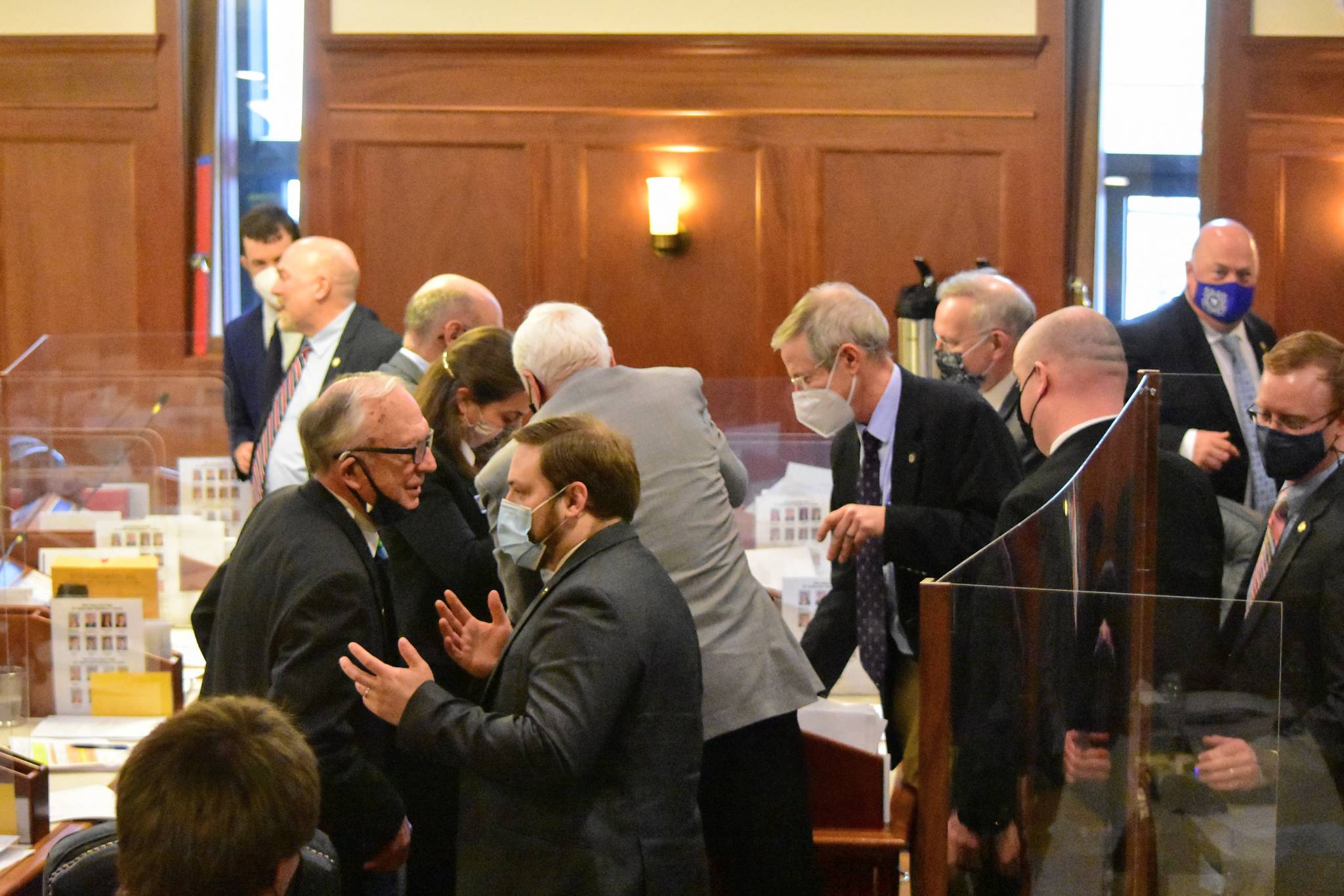The state’s budget bill became a battleground for partisan issues Monday as dozens of amendments submitted in the House of Representatives would have made drastic changes to state policies. House members spent all day debating more than 60 amendments covering topics such as vaccines mandates, abortions and union dues. As of 5:15 p.m. Monday, debate was ongoing.
“At this point, it feels like we’re just putting special orders in our budget document,” said Rep. Jonathan Kreiss-Tomkins, D-Sitka, referring to the time during floor sessions when lawmakers are allowed to deliver speeches on topics of their choice.
Several of the amendments passed Monday did make cuts to state programs or other technical changes, but many dealt with issues not directly covered by the budget. Rep. Josiah Patkotak, I-Utqiaġvik, a member of the House Majority Coalition, was excused Monday, giving the Republican minority an advantage when advancing their amendments.
An amendment from Rep. Chris Kurka, R-Wasilla, preventing funding for abortions in Medicaid services passed 21-18. That amendment would clearly violate Alaska’s constitution, said Rep. Ivy Sponholz, D-Anchorage, during debate, and would ultimately cost the state time and money in terms of litigation.
[Speaker: House to pass budget Monday, special session likely]
Rep. Sarah Vance, R-Homer, submitted an amendment that would allow people to carry firearms onto University of Alaska campuses. Vance has put the idea forward before, noting Alaska’s high rates of sexual assault and saying allowing people to carry guns would “level the playing field” for potential victims of assault. That amendment failed by only one vote, 19-20.
Rep. David Eastman, R-Wasilla, submitted two amendments that would have withheld certain funding unless the Legislature also passed bill addressing certain subjects. One amendment would have withheld funding for the Alaska Council on the Arts unless the state passed a bill supporting Second Amendment rights. Another amendment submitted by Eastman would have used the same contingency funding mechanism but for an as-yet unwritten bill to strengthen Alaska’s election security. Eastman attended former President Trump’s rally on Jan. 6, but has said he was not part of the crowd that attacked the Capitol.
Rep. Ben Carpenter, R-Nikiski, submitted an amendment that would have prevented employers from requiring their employees to receive vaccines. Carpenter said he had heard concern from constituents that forced vaccines were coming.
“People are worried that that is coming,” Carpenter said. “People are concerned that portions of the Legislature are going to require vaccinations in this state.”
Gov. Mike Dunleavy has repeatedly said there will be no vaccine mandates in Alaska and any bills passed by the Legislature must be signed by the governor before becoming law.
Several Republican lawmakers objected to the use of contingency funding but said they supported the intent of the amendments. Rep. Kevin McCabe, R-Big Lake, said there were still pending lawsuits concerning the outcome of the 2020 presidential election and the state should match the amount it spends on the arts on the support of Second Amendment rights.
Eastman also submitted several amendments that argued the state was not in compliance with the federal 2018 Janus v. American Federation of State, County, and Municipal Employees Council 31 decision. However, in February an Alaska Superior Court ordered the state to pay $186,000 in damages after losing a court case regarding the issue.
In 2019, former Attorney General Kevin Clarkson issued a legal opinion saying the state was not in compliance with the Janus decision, but in February Superior Court Judge Gregory Miller wrote: “the (2019) legal opinion is incorrect and that Administrative Order 312 is invalid and has no legal effect.”
Rep. Andy Josephson, D-Anchorage, noted the lawsuit and argued the state was wasting money on frivolous lawsuits.
“(Gov. Mike Dunleavy’s) administration has wasted millions chasing windmills on Janus litigation,” Josephson said.
The bill for the state’s mental health budget was scheduled to be heard Monday, but the debate on the operating budget took lawmakers into the evening.
Once passed by the House, the operating budget will be sent to the Senate where its items will be incorporated into a bill for the state’s capital budget. Lawmakers hope to pass a budget before May 19, after which a special session will have to be called.
Both bodies are scheduled to meet at 11 a.m. Tuesday in a joint session to confirm the governor’s appointees.
• Contact reporter Peter Segall at psegall@juneauempire.com. Follow him on Twitter at @SegallJnuEmpire.

